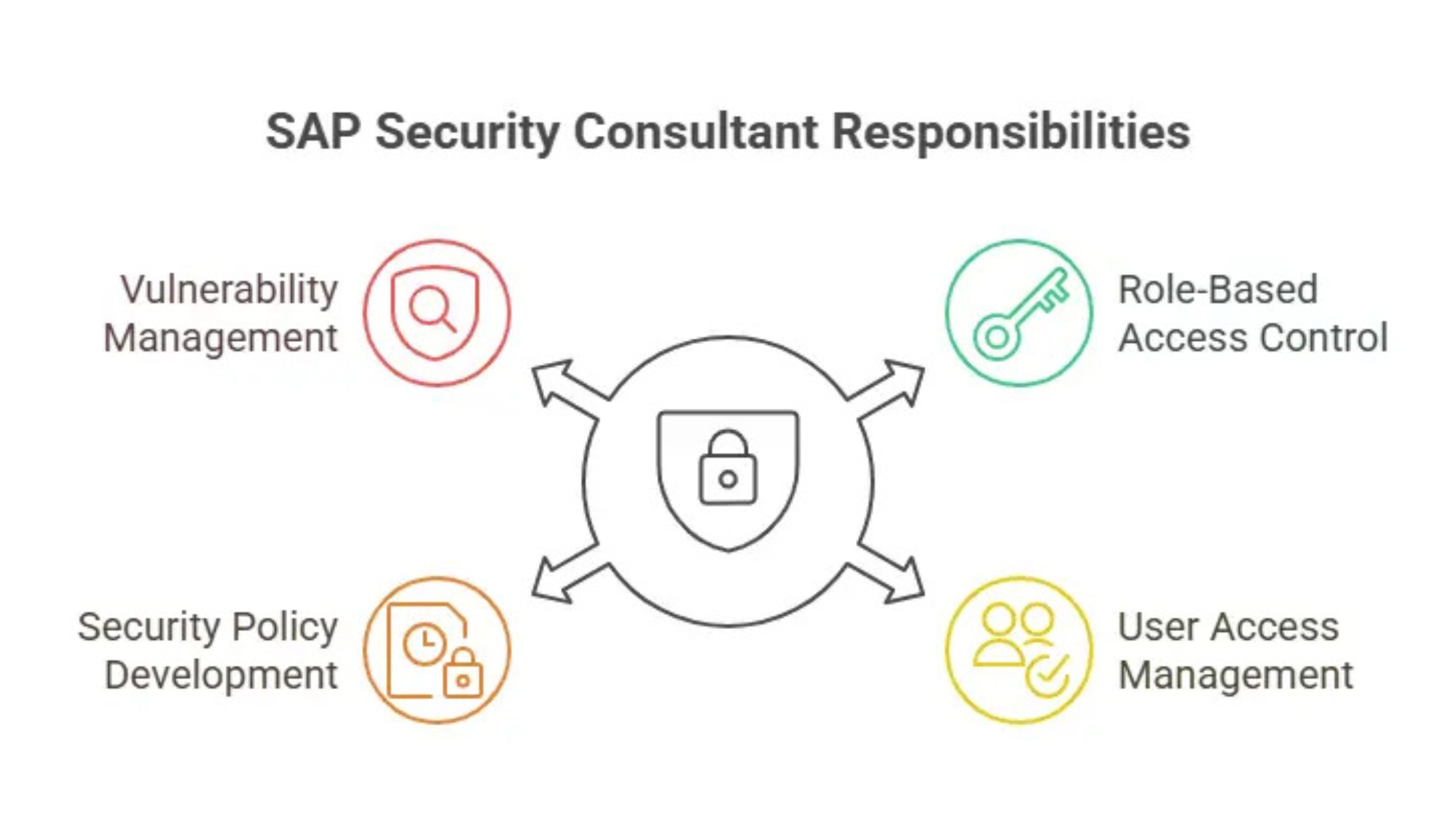In today’s digital-first enterprise landscape, data is the lifeblood of business operations. For organizations running SAP systems, protecting sensitive information is critical—not just for business continuity but also for regulatory compliance. This is where an SAP Security Consultant plays a pivotal role.
This blog will explore how these specialists safeguard SAP environments, ensure compliance, and protect your business from cyber threats.
What is an SAP Security Consultant?
An SAP Security Consultant is an expert responsible for managing security measures within SAP landscapes. Their core duties include:
- Designing and implementing user roles and permissions.
- Monitoring and auditing system access.
- Ensuring compliance with local and international regulations.
- Collaborating with IT and business teams to reduce security risks.
In essence, they act as the bridge between SAP system management and enterprise cybersecurity requirements, ensuring your organization’s data remains safe and compliant.
Key Responsibilities of an SAP Security Consultant

1. Role-Based Access Control (RBAC) Implementation
SAP Security Consultants design role-based access controls to ensure users only have access to the data necessary for their job. Benefits include:
- Minimizing insider threats.
- Reducing errors caused by unauthorized access.
- Ensuring compliance with data privacy regulations such as GDPR, SOX, and HIPAA.
2. User Access Management and Audits
Regular monitoring and auditing are essential for data compliance. SAP Security Consultants perform:
- User provisioning and de-provisioning: Ensuring employees who leave or change roles lose or gain access appropriately.
- Segregation of duties (SoD): Preventing conflicting access rights that can lead to fraud.
- Periodic audits: Identifying potential vulnerabilities before they become risks.
3. Security Policy Development
An SAP Security Consultant develops policies that govern:
- Password management and multi-factor authentication.
- Encryption standards for data in transit and at rest.
- Logging and monitoring to detect suspicious activities.
These policies are tailored to meet corporate, industry, and local compliance requirements, ensuring that SAP systems adhere to best practices.
4. Vulnerability Management
SAP systems can have inherent vulnerabilities. A consultant identifies and mitigates risks by:
- Applying security patches promptly.
- Configuring SAP GRC (Governance, Risk, and Compliance) tools.
- Implementing continuous monitoring for unusual system behavior.
How SAP Security Consultants Ensure Data Compliance
Regulatory compliance is more than just a legal requirement—it is vital for maintaining customer trust. Here’s how consultants ensure compliance:
1. Mapping Regulations to SAP Systems
- Identify applicable regulations (e.g., NCA in Saudi Arabia, GDPR in Europe, SOX in the USA).
- Translate requirements into SAP security measures.
2. Implementing Segregation of Duties (SoD)
- Prevent a single user from performing conflicting transactions.
- Use SAP GRC tools to continuously monitor SoD violations.
3. Regular Compliance Audits
- Generate audit-ready reports.
- Track access, changes, and critical transactions to maintain a full compliance trail.
4. Data Encryption & Protection
- Configure encryption for sensitive fields in SAP tables.
- Enable SSL/TLS for SAP NetWeaver communications.
- Manage access to production systems to minimize the risk of data breaches.
Tools and Technologies Used by SAP Security Consultants
ToolPurposeSAP GRC Access ControlAutomates SoD, audits, and user access policiesSAP Identity ManagementCentralized user management and provisioningSAP Security Audit LogsTrack and analyze system activityEncryption Tools (SSL, PGP)Data protection in transit and at restSecurity Monitoring SolutionsReal-time alerts on unauthorized access
These tools allow consultants to maintain both security and compliance, enabling smooth audits and operational efficiency.
Benefits of Hiring an SAP Security Consultant
- Regulatory compliance: Avoid penalties and meet global standards.
- Data protection: Safeguard critical business and customer data.
- Risk reduction: Proactively detect and mitigate vulnerabilities.
- Operational efficiency: Streamlined user access and monitoring reduce administrative overhead.
- Strategic advisory: Guide businesses in implementing security best practices aligned with organizational goals.
Best Practices for SAP Security
- Regular Patch Management – Ensure the system is up-to-date to prevent exploits.
- Segregation of Duties – Implement SoD policies to minimize internal risks.
- Continuous Monitoring – Leverage monitoring tools to detect anomalies early.
- Strong Authentication – Enforce multi-factor authentication and secure passwords.
- Training & Awareness – Educate users about security policies and risks.
How SAP Security Consultants Add Value
An experienced SAP Security Consultant does more than protect data—they enable business growth. By aligning security strategies with enterprise objectives, they:
- Allow faster deployment of new SAP modules securely.
- Facilitate cloud migration while maintaining compliance.
- Enhance confidence among stakeholders and customers.
FAQs (Answer Engine Optimized)
Q1: What does an SAP Security Consultant do?
A: They manage SAP system security, implement access controls, ensure compliance, and protect sensitive data.
Q2: Why is SAP security important?
A: SAP stores critical business and customer data; poor security can lead to financial loss, regulatory penalties, and reputational damage.
Q3: Which tools are used for SAP security?
A: SAP GRC Access Control, SAP Identity Management, security audit logs, encryption tools, and real-time monitoring solutions.
Q4: How does SAP GRC help in compliance?
A: SAP GRC automates segregation of duties, monitors user activity, and generates audit-ready compliance reports.
Q5: Can a consultant help with cloud SAP systems?
A: Yes. Consultants secure both on-premises and cloud SAP environments, ensuring data protection and regulatory compliance.
Conclusion
Protecting SAP systems is critical for modern enterprises. SAP Security Consultants ensure data is secure, regulatory requirements are met, and risks are minimized. By leveraging best practices, robust tools, and strategic oversight, organizations can confidently manage sensitive information while driving business growth.
📞 Talk to TForce experts today to ensure your SAP environment is secure, compliant, and future-ready.

